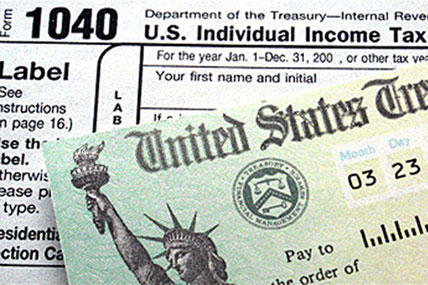It's getting to be that time of year when we need to start seriously thinking about filing our taxes (and in fact, many people have already filed). It's also good time to think about what you will do with your tax refund if you get one.
If you have debt of any kind, this question is even more important for you.
Many Americans get a tax refund each year. One estimate from last year indicated that over 60% of Americans were expecting to receive a tax refund. And for many of us, it is the one time of year we can significantly improve our financial standing. After all, when else do we receive a lump sum of money deposited straight into our pocket or bank account?
That's why it is so important to use your tax refund wisely. For those who have debt, it's an opportunity to get one step closer to financial freedom. Here are some ideas for what you should do with your tax refund if you have debt:
1. Start an emergency fund
It may seem counterintuitive, but even if you have debt — and interest charges burning a hole in your pocket — it's still more important to have an emergency fund. Why? Because if you have no emergency fund, you are at risk from all the little things that can come up during the month that threaten to throw your finances off track if you don't have an emergency fund to pay for them.
For example, if your child has a toothache, your car is making a strange rattling sound, or you get an unexpectedly large utility bill, an emergency fund allows you to take care of these things immediately, whereas if you don't have one the “small” things like this can turn into bigger problems that will cost you more money if not addressed quickly.
A toothache can turn into a major dental procedure, a rattle under the hood of your car can turn into a major breakdown, a late payment on your utility bill can turn into a debt being sent to collections. That's why it's a good idea to have an emergency fund of at least $1,000. Many experts recommend having an emergency fund equal to 3 months of your salary, and that's a great idea. But $1,000 is a good place to start.
2. Pay off high-interest debt first
Okay, now what if you have an emergency fund that you're comfortable with? Then it's time to focus on getting out of debt. Having debt is like an emergency of its own, because those interest payments are taking money out of your pocket each month which you could be using to pay for other important expenses.
That means you should use as much of your tax refund as possible to pay off debt. But which debt should you pay off first? In most cases, you should pay off the debt with the highest interest rate first. For example, if you have a credit card with a 15% interest rate and a student loan with a 6% interest rate, you should pay the credit card off first.
If you get a tax refund of $2,000 and you have a credit card debt of $1,000 you could pay off the credit card and then use the rest to pay down any other debt you have or to bolster your emergency fund.
3. Use it to boost your career
Is there anything else besides an emergency fund and debt payments that would be a financially responsible use of your tax refund money? Well, yes, there is. It might not be something you'd think of immediately, but you could actually use it to take your career to the next level by enrolling in a training or degree program that will help you increase your income or get promotions in the future.
Examples might be if you wanted to be a certified financial planner, wanted to become a personal trainer, or perhaps were interested in getting a degree to become a teacher. Whatever your dream career (and dream job) may be, it's possible that you've been waiting for the right time to get that extra credential. And the tax refund might provide the financial opportunity to make it happen.
Just remember that ultimately the tax refund is a once-a-year chance to improve your financial situation. The last thing you want to do is spend it on something that will have no lasting impact on your life, like a bigger television or a new wardrobe. If you have debt, your focus has to be on getting rid of the debt as quickly as possible and moving on with your life so you can enjoy financial freedom.




